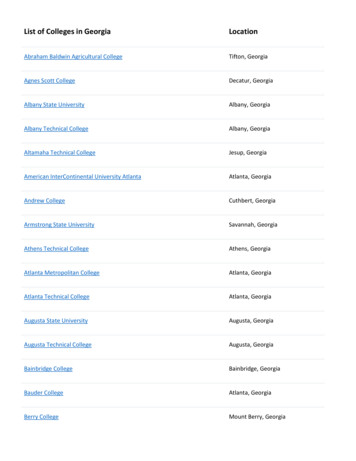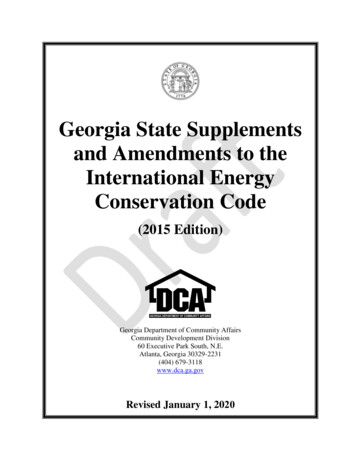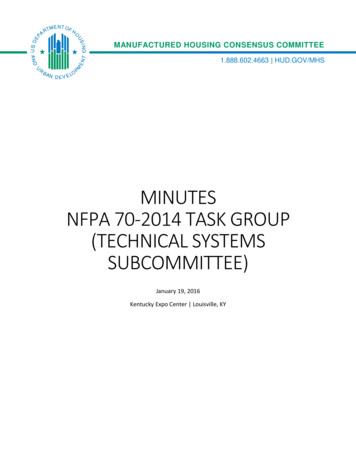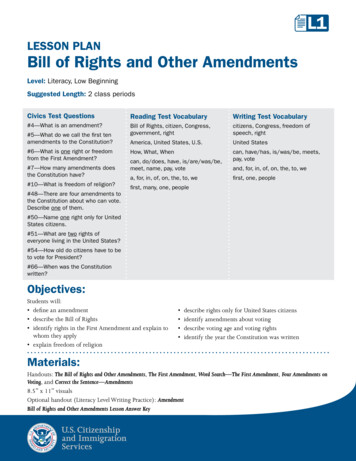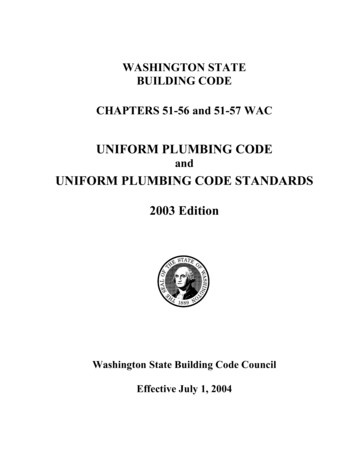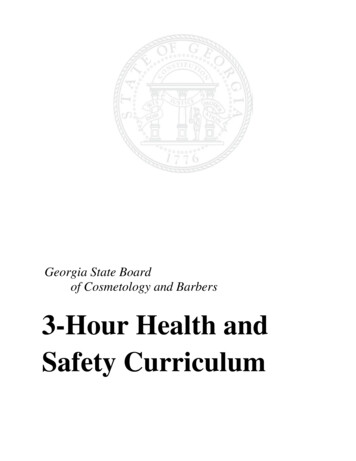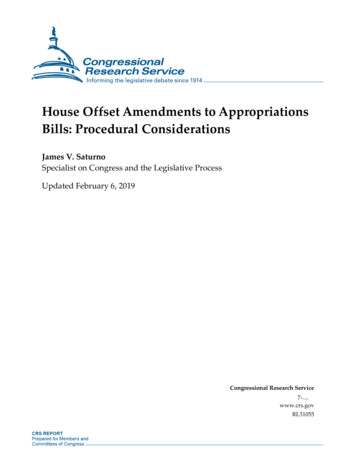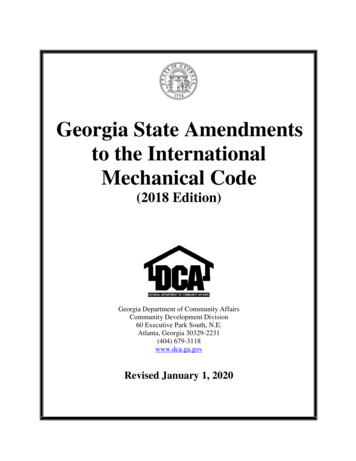
Transcription
Georgia State Amendmentsto the InternationalMechanical Code(2018 Edition)Georgia Department of Community AffairsCommunity Development Division60 Executive Park South, N.E.Atlanta, Georgia 30329-2231(404) 679-3118www.dca.ga.govRevised January 1, 2020
GEORGIA STATE MINIMUM STANDARD MECHANICAL CODE(INTERNATIONAL MECHANICAL CODE WITH GEORGIA STATE AMENDMENTS)The INTERNATIONAL MECHANICAL CODE, 2018 Edition, published by theInternational Code Council, when used in conjunction with these Georgia State Amendments,shall constitute the official Georgia State Minimum Standard Mechanical Code.GEORGIA STATE AMENDMENTSCODE REFERENCE:(a) Replace all references to the ICC Electrical Code with references to the Georgia State MinimumStandard Electrical Code (National Electrical Code with Georgia State Amendments).(b) Replace all references to the International Energy Conservation Code (IECC) with references tothe Georgia State Minimum Standard Energy Code (IECC with Georgia StateSupplements and Amendments). The Georgia State Minimum Standard Energy Code shall beused for efficiency and coefficient of performance ratings of mechanical equipment.APPENDICES:Appendices are not enforceable unless they are specifically referenced in the body of the code oradopted by the Department of Community Affairs or the authority having jurisdiction.SCOPE:The provisions of the Georgia State Minimum Standard Mechanical Code shall regulate thedesign, installation, maintenance, alteration and inspection of mechanical systems that arepermanently installed and utilized to provide control of environmental conditions and relatedprocesses within buildings. This code shall also regulate those mechanical systems, systemcomponents, equipment and appliances specifically addressed herein. The installation of fuel gasdistribution piping and equipment, fuel gas-fired appliances and fuel gas-fired appliance ventingsystems shall be regulated by the Georgia State Minimum Standard Gas Code (InternationalFuel Gas Code with Georgia Amendments).Exception #1: Detached one- and two-family dwellings and multiple single-familydwellings (townhouses) not more than three stories above grade with separate means ofegress and their accessory structures shall comply with the Georgia State MinimumStandard One- and Two-Family Dwellings Code ( International Residential Code for Oneand Two- Family Dwellings with Georgia State Amendments).Exception #2: The following table titled ‘Codes Reference Guide’ establishes specificprimary and supplementary code applications and is to be applied by the authority havingjurisdiction.GA International Mechanical Code Amendments 20202
CODES REFERENCE GUIDEAreaPrimarySupplementOccupancy ClassificationBuilding Construction Typesincluding allowable height,allowable building areas, and therequirements for sprinklerprotection related to minimumbuilding construction types.Means of EgressStandpipesInterior FinishHVAC SystemsVertical OpeningsSprinkler Systems minimumconstruction standardFire Alarm SystemsSmoke Alarms and SmokeDetection NENONENONELSCStateStatuteand LSCIFCLSC andNFPA 96IFGCNFPA 58NFPA 52NONEPortable Fire ExtinguishersCooking EquipmentFuel Fired AppliancesLiquid Petroleum GasCompressed Natural GasNONENONENONENFPA 54NFPA 54NONEGEORGIA STATE MINIMUMREQUIREMENTS FOR BOILERS/WATER HEATERS AND PRESSURE VESSELSThe State’s minimum requirements for boilers/water heaters and pressure vessels over 200,000BTU/h (58.61 kW), 210 degrees Fahrenheit or 120 gallons capacity shall be established by O.C.G.A.Title 25, Chapter 15 and the Rules and Regulations of the Office of Insurance and Safety FireCommissioner.GA International Mechanical Code Amendments 20203
*Revise the International Mechanical Code, 2018 Edition, as follows:CHAPTER 1ADMINISTRATION*Delete Chapter 1 ‘Administration’ without substitution. Chapter 1 to remain in the Code as areference and guide for local governments in the development of their own AdministrativeProcedures.(Effective January 1, 2020)CHAPTER 2DEFINITIONSSECTION 202GENERAL DEFINITIONS*Add Definition of ‘MAKE-UP AIR’ to read as follows:MAKE-UP AIR. SEE ENVIRONMENTAL AIR(Effective January 1, 2020)CHAPTER 3GENERAL REGULATIONSSECTION 301GENERAL*Revise Section 301.1 ‘Scope’ to read as follows:301.1 Scope. This chapter shall govern the approval and installation of all equipment and appliancesthat comprise parts of the building mechanical systems regulated by this code.(Effective January 1, 2020)*Revise Section 301.2 ‘Energy utilization’ to read as follows:301.2 Energy utilization. Heating, ventilating and air-conditioning systems of all structuresshall be designed and installed for efficient utilization of energy in accordance with the InternationalEnergy Conservation Code. Cooling towers installed in new construction shall be in compliancewith ASHRAE, Standard 90.1.(Effective January 1, 2020)*Revise Section 301.7 ‘Listed and labeled’ to read as follows:301.7 Listed and labeled. Appliances regulated by this code shall be listed and labeled for theapplication in which they are installed and used, unless otherwise approved.Exception to remain unchanged.(Effective January 1, 2020)GA International Mechanical Code Amendments 20204
*Add new Section 301.19 ‘Related fire codes’ to read as follows:301.19 Related fire codes. Any reference to the International Fire Code and/or NFPA standardsin any chapter of this code shall be to the latest edition as adopted and amended by the GeorgiaInsurance and Safety Fire Commissioner.(Effective January 1, 2020)SECTION 306ACCESS AND SERVICE SPACE*Revise Section 306.3 ‘Appliances in attics’ to add new exception to read as follows:306.3 Appliances in attics.Exceptions:3. In Residential Occupancies, attics containing appliances or mechanical equipment serviceshall be accessible by pull down stairs or other permanent steps and at a minimum besized to allow the removal of the largest appliance.(Effective January 1, 2020)CHAPTER 4VENTILATIONSECTION 401GENERAL*Add new Section 401.7 ‘Alternative ventilation procedures’ to read as follows:401.7 Alternative ventilation procedures. As an alternative to Chapter 4, the following shall bepermitted:1. Ventilation Rate Procedure, Natural Ventilation Procedure or Indoor Air QualityProcedure, as prescribed by ASHRAE 62.1. Software programs to calculate outdoorventilation air may be used to demonstrate ASHRAE 62.1 compliance, as approved byauthority having jurisdiction.2. Or a combination of ASHRAE 62.1 and ANSI/ASHRAE/ASHE Standard 170 may beutilized for different occupancy types within in a single building.(Effective January 1, 2020)GA International Mechanical Code Amendments 20205
CHAPTER 5EXHAUST SYSTEMSSECTION 501GENERAL*Revise Section 501.3 ‘Exhaust discharge’ Exception #1 to read as follows:501.3 Exhaust discharge.Exceptions:1. Whole-house ventilation-type attic fans shall be permitted to discharge into the ventilatedattic space of dwelling units having private attics, provided the installed system meetsparagraph 501.4 requirements for pressure equalization.(Effective January 1, 2020)SECTION 505DOMESTIC COOKING EXHAUST EQUIPMENT*Add new Section 505.3.1 ‘Exhaust ducts for domestic range hoods installed in commercialapplications’ to read as follows:505.3.1 Exhaust ducts for domestic range hoods installed in commercial applications. Exhaustducts for domestic range hoods installed in commercial applications shall be vented to the outsideand shall be constructed of (a) Type B vent, or (b) smooth wall duct constructed of galvanized orstainless steel with a minimum duct thickness of 0.0157 inches (0.40 mm) or constructed ofaluminum or copper with a minimum duct thickness of 0.023 inches (0.58mm).(Effective January 1, 2020)*Add new Section 505.7 ‘Commercial installations of domestic systems’ to read as follows:505.7 Commercial installations of domestic systems. Commercial installations of domesticsystems shall comply with the current Life Safety Code NFPA 101 and 96 standards as adoptedand amended by the Georgia Insurance and Safety Fire Commissioner.(Effective January 1, 2020)GA International Mechanical Code Amendments 20206
SECTION 506COMMERCIAL KITCHEN HOOD VENTILATION SYSTEM DUCTS AND EXHAUSTEQUIPMENT*Delete Section 506.1 ‘General’ and substitute the following:506.1 General. The State’s minimum requirements for Type I commercial kitchen hood ventilationsystem ducts and exhaust equipment shall be designed, constructed and installed in accordance withthe Life Safety Code NFPA 101 and NFPA 96 as adopted and amended by the Georgia Insuranceand Safety Fire Commissioner. Other commercial kitchen hood ventilation system ducts and exhaustequipment shall comply with the requirements of this section.(Effective January 1, 2020)SECTION 507COMMERCIAL KITCHEN HOODS*Delete Section 507.1 ‘General’ and substitute the following:507.1 General. The State’s minimum requirements for Type I commercial kitchen hoods shallbe designed, constructed and installed in accordance with the Life Safety Code NFPA 101 andNFPA 96 as adopted and amended by the Georgia Insurance and Safety Fire Commissioner. Othercommercial kitchen hoods shall comply with the requirements of this section.(Effective January 1, 2020)*Delete Section 507.1.2 ‘Domestic cooking appliances used for commercial purposes’ withoutsubstitution.(Effective January 1, 2020)SECTION 509FIRE SUPPRESSION SYSTEMS*Delete Section 509.1 ‘Where required’ and substitute the following:509.1 Where required. The State’s minimum requirements for fire suppression systems forcommercial cooking equipment shall be established by the Life Safety Code NFPA 101 and NFPA96 as adopted and amended by the Georgia Insurance and Safety Fire Commissioner.(Effective January 1, 2020)GA International Mechanical Code Amendments 20207
CHAPTER 6DUCT SYSTEMSSECTION 606SMOKE DETECTION SYSTEMS CONTROL*Rename Section 606.2.1 ‘Return air systems’ and revise to read as follows:606.2.1 Supply air systems. Smoke detectors shall be installed in supply air systems with a designcapacity greater than 2,000 cfm (0.9m3/s), in the supply air duct downstream of any filters, fanmotors, outdoor air connections, and upstream of any branch connections or decontaminationequipment and appliances.Exception: Smoke detectors are not required in the supply air system where all portions ofthe building served by the air distribution system are protected by area smoke detectorsconnected to a fire alarm system in accordance with NFPA 72. The area smoke detectionsystem shall comply with Section 606.4.(Effective January 1, 2020)*Revise Section 606.2.2 ‘Common supply and return air systems’ to read as follows:606.2.2 Common supply and return air systems. Where multiple air-handling systems sharecommon supply or return air ducts or plenums with a combined design capacity greater than 2,000cfm (0.9m3/s), the supply air system shall be provided with smoke detectors in accordance withSection 606.2.1.Exception: Individual smoke detectors shall not be required for each fan-powered unit, providedthat such units do not have an individual design capacity greater than 2,000 cfm (0.9m3/s) and willbe shut down by activation of one of the following;1. Smoke detectors required by Sections 606.2.1 and 606.2.3.2. An approved area smoke detector system located in the supply air duct serving such units.3. An area smoke detector system as prescribed in the exception to Section 606.2.1.In all cases, the smoke detectors shall comply with sections 606.4 and 606.4.1.(Effective January 1, 2020)*Revise Section 606.4.1 ‘Supervision’ first sentence to read as follows:606.4.1 Supervision. The duct smoke detectors shall be connected to a fire alarm system where afire alarm system is required by the Life Safety Code NFPA 101 and NFPA 96 as adopted andamended by the Georgia Insurance and Safety Fire Commissioner.(Effective January 1, 2020)GA International Mechanical Code Amendments 20208
CHAPTER 8CHIMNEYS AND VENTSSECTION 804DIRECT-VENT, INTERGRAL VENT AND MECHANICAL DRAFT SYSTEMS*Revise Section 804.3.8 ‘Mechanical draft systems for manually fired appliances and fireplaces’numbers 2 and 3 to read as follows:804.3.8 Mechanical draft systems for manually fired appliances and fireplaces.#2 A device shall be installed that produces visible and audible warning upon failure of themechanical draft device or loss of electrical power, at any time that the mechanical draftdevice is turned on. This device shall be installed in an approved location, receive powerfrom the building wiring and equipped with a battery backup.#3 A smoke detector shall be installed in the room with the appliance or fireplace. Thisdevice shall receive power from the building wiring and equipped with a battery backup.(Effective January 1, 2020)CHAPTER 9SPECIFIC APPLIANCES, FIREPLACES AND SOLID FUEL-BURNING EQUIPMENTSECTION 908COOLING TOWERS, EVAPORATIVE CONDENSERS AND FLUID COOLERS* Revise Section 908.1 ‘General’ to read as follows:908.1 General. A cooling tower used in conjunction with an air-conditioning appliance shall beinstalled in accordance with the manufacturer’s installation instructions. Factory-built coolingtowers shall be listed in accordance with UL 1995. The standards related to high efficiency coolingtowers shall include without limitation the minimum standards prescribed by ASHRAE 90.1.(Effective January 1, 2020)SECTION 917COOKING APPLIANCES*Revise Section 917.1 ‘Cooking appliances’ to add new Exception to read as follows:Exception:Listed and labeled commercial cooking appliances may be installed in dwelling units anddomestic kitchens when such installation is designed by a Georgia Licensed ProfessionalEngineer and accepted by the local authority having jurisdiction.(Effective January 1, 2020)*Delete Section 917.2 ‘Domestic appliances’ without substitution.(Effective January 1, 2020)GA International Mechanical Code Amendments 20209
CHAPTER 10BOILERS, WATER HEATERS AND PRESSURE VESSELSSECTION 1001GENERAL*Revise Section 1001.1 ‘Scope’ to add the following at the end of first paragraph:1001.1 Scope. and pressure vessels. The State’s minimum requirements for boilers/water heatersand pressure vessels over 200,000 BTU/h (58.61 kW), 210 degrees Fahrenheit or 120 gallonscapacity shall be established by O.C.G.A. Title 25, Chapter 15 and the as adopted and amended Rulesand Regulations of the Office of Insurance and Safety Fire Commissioner.(Effective January 1, 2020)CHAPTER 11REFRIGERATIONSECTION 1105MACHINERY ROOM, GENERAL REQUIREMENTS*Renumber Section [F] 1105.3 ‘Refrigerant detector’ as 1105.3 and revise to read as follows:1105.3 Refrigerant detector. Refrigerant detectors in machinery rooms shall be provided asrequired in accordance with ASHRAE 15.(Effective January 1, 2020)SECTION 1106MACHINERY ROOM, SPECIAL REQUIREMENTS*Renumber Section [F] 1106.6 ‘Remote controls’ as 1106.6 and revise to read as follows:1106.6 Remote controls. Remote control of the mechanical equipment and appliances located inthe machinery room shall be provided as required in accordance with ASHRAE 15.(Effective January 1, 2020)*Renumber Section [F] 1106.7 ‘Emergency signs and labels’ as 1106.7 and revise to readas follows:1106.7 Emergency signs and labels. Refrigeration units and systems shall be provided withapproved emergency signs, charts and labels in accordance with ASHRAE 15.(Effective January 1, 2020)GA International Mechanical Code Amendments 202010
CHAPTER 12HYDRONIC PIPINGSECTION 1206PIPING INSTALLATION*Revise Section 1206.8 ‘Steam piping pitch’ to add the following at the end of the paragraph:1206.8 Steam piping pitch. the steam piping. Branch piping from steam mains shall be takenoff at the top of the pipe.(Effective January 1, 2020)CHAPTER 13FUEL OIL PIPING AND STORAGESOLAR THERMAL SYTEMSSECTION 1301GENERAL*Revise Section 1301.1 ‘Scope’ to add the following at the end of the paragraph:1301.1 Scope. International Fire Code. The State’s minimum requirements for fuel oil pipingand storage shall be as established by the Georgia State Minimum Fire Safety Standards and theas adopted and amended Rules and Regulations of the Georgia Insurance and Safety FireCommissioner. Any areas not addressed by the Georgia State Minimum Fire Safety Standardsshall be regulated by this chapter.(Effective January 1, 2020)CHAPTER 14SOLAR THERMAL SYTEMSSECTION 1402INSTALLATION*Revise Section 1402.4 ‘Protection from freezing’ to read as follows:1402.4 Protection from freezing at the lowest ambient temperatures that will be encountered. Freeze (Remainder of paragraphto remain unchanged).(Effective January 1, 2020)GA International Mechanical Code Amendments 202011
SECTION 1403HEAT TRANSFER FLUIDS*Add new Section 1403.2.1 ‘Protection of drains’ to read as follows:1403.2.1 Protection of drains. Drains serving heat transfer fluids over 140 F (60 C) or which aretoxic or corrosive shall be protected in accordance with the requirements of The InternationalPlumbing Code.(Effective January 1, 2020)CHAPTER 15REFERENCED STANDARDS*Revise Chapter 15 ‘Referenced Standards’ to add the following:ASHRAEAtlanta, GA ergy Standard for Buildings ExceptLow-riseResidential Buildings62.1--2016Ventilation for Acceptable Indoor AirQuality15—2016Safety Standard for RefrigerationSystems170-2017Referencedin codesection number301.2, 908.1, GAAmendments401.7, GA Amendments1105.3, 1106.6, 1106.7, GAAmendments401.7, GA AmendmentsVentilation of Health Care FacilitiesNFPAStandardreferencenumber96101National Fire Protection Association, Battery March Park, Quincy, MA 02269Referencedin codeTitlesection numberStandard for Ventilation and Fire Protection of CommercialCooking Operations505.7, 506.1, 507.1,508.1, 509.1, GAAmendmentsLife Safety Code506.1, 507.1, 508.1, 509.1,GA Amendments(Effective January 1, 2020)End of Amendments.Authority: O.C.G.A. § 8-2-20 et seq.GA International Mechanical Code Amendments 202012
and Safety Fire Commissioner. Other commercial kitchen hood ventilation system ducts and exhaust equipment shall comply with the requirements of this section. (Effective January 1, 2020) SECTION 507 COMMERCIAL KITCHEN HOODS *Delete Section 507.1 'General' and substitute the following: 507.1 General.


